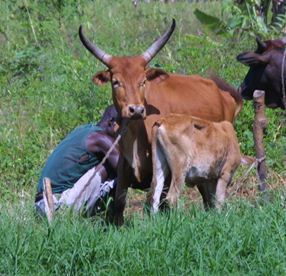
News, Events and Blog Postings

Informal food vendors: urban food security’s invisible experts
The research involved vendors, their customers and the settlement’s livestock keepers in mapping activities and focus group discussions (read the associated blog and briefing paper). Community members identified challenges that go beyond a lack of access to food, such as problems with infrastructure, environmental hazards, lack of capital and contested public spaces.

Emerging zoonotic diseases
Globally, zoonotic diseases are of significance owing to their increased public health threat and the negative impact on animal production, commerce, travel and economies. The importance of zoonotic diseases in rural areas extends beyond the realm of public health. Apart from causing human disease and mortality, they affect the agricultural production and social structures of a community. Zoonotic diseases decrease the availability of food, creating local and international trade barriers. In addition, the more remote the area, the less access there is to public health care and veterinary care. Despite this, many areas with so called emerging agricultural systems are also highly connected to centres of high population density where the markets for agricultural products are – so zoonoses are an issue in both sites of production, and of consumption.

Launch of the new Zoonotic and Emerging infectious Disease Group Website
We are pleased to announce the launch of the new website, along with a new look, we have included some features that we hope will make visiting the site easier, enjoyable and a more interactive experience.

Promoting Food Access and Livelihoods for Vendors in Informal Settlements
Kenya’s urban poor federation Muungano wa Wanavijiji is working with food vendors in informal settlements to reveal their challenges and explore how to promote food security. The ongoing project is complementing other Urban Zoo activities, as well as building upon Muungano’s past experience with grassroots data-collection and advo-cacy. Working alongside Muungano are community residents, pro-poor financial analysts at Akiba Mashinani Trust (Muungano’s financial wing), and researchers at University College London and UC Berkeley. This action-research project is utilising participatory methods to understand vendors in Nairobi’s informal settlements of Korogocho and Viwandani. Vendors sell a variety of items in these settlements such as fresh produce; meat, fish, and eggs; cooked and uncooked foods; beverages; and snacks.

Middle East Respiratory Syndrome Corona Virus (MERS-CoV) – What do we know?
In collaboration with a number of partners, including St Louis Zoo, the Mpala Research Center and the Erasmus Medical University, we are investigating elements of the epidemiology of MERS-CoV in camels in Kenya to help answer some of the above questions. These studies are an extension of the Urban Zoo project’s activities investigating camel value chains in Kenya and Nairobi.

Urban Zoo Project in the A4NH 2014 Annual report
Zoonoses, or diseases that can pass between animals and humans, lead to 2.4 billion cases of illness and 2.2 million deaths per year, according to ILRI scientist, Delia Grace. The 13 major culprits include bacterial infections such as brucellosis and leptospirosis, as well as other infections, like bovine tuberculosis. It is estimated that more than 75 percent of diseases that have emerged over the past 20 years originated in animals.

Food Standard Agency reveals Campylobacter in third of supermarket chicken
The Food Standards Agency’s (FSA) yearlong study into Campylobacter in chicken has reported that 73% of birds test positive for the infection. Paul Wigley, Professor of Avian Infection and Immunity at the University of Liverpool, said: “The results of the FSA study are of little surprise. Campylobacter infection is endemic in chicken production and similar levels are found in other EU countries with large poultry industries.

Genomic data reveals emergence in Africa of drug resistant strain of typhoid
The University of Liverpool and Liverpool School of Tropical Medicine, in partnership with the Wellcome Trust Sanger Institute, have revealed the emergence of a novel strain of Typhoid fever in Malawi, Africa. The team has completed two genomics studies on the tropical disease, a condition that is estimated to cause up to 30 million illnesses and over a quarter of a million deaths globally each year.

The (neglected) ties binding human and animal health
Animal diseases make up 60 per cent of all human pathogens and have a significant impact on poverty. Yet for many years, the worst diseases were sorely neglected by the international community. Eric Fevre describes how this turned around, and what researchers are now doing to tackle it.





















































![October 2012: Visitor [Nicola Wardrop]](https://i0.wp.com/www.zoonotic-diseases.org/wp-content/uploads/2015/04/Nicola-Wardrop.jpg?fit=100%2C100)








You must be logged in to post a comment.